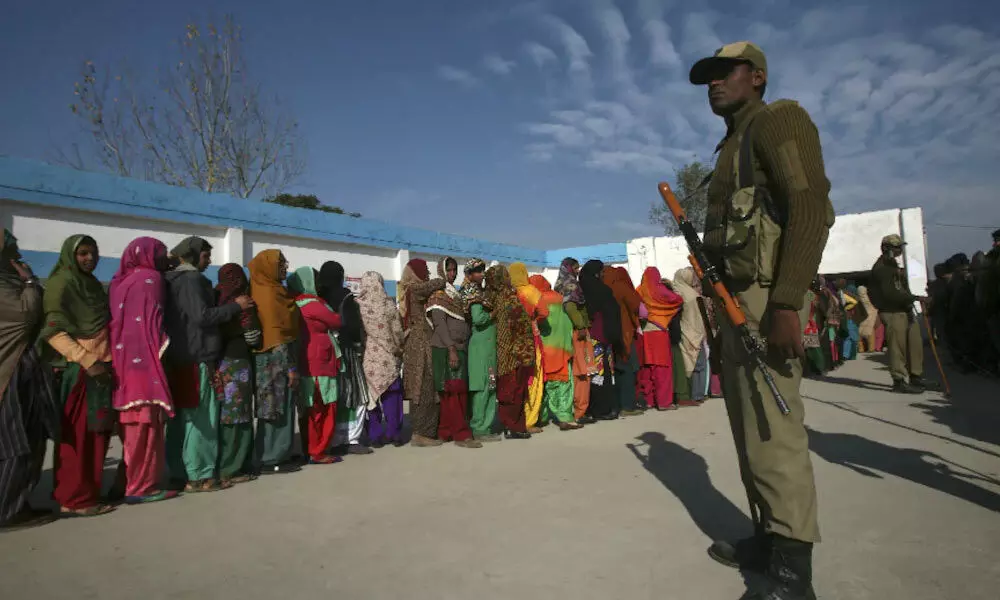Live
- TDP candidate assures to provide concession on power tariff
- BS Maqbool Urges Voters to Support Good Governance in Election Campaign
- Chief Minister makes YSRCP’s stance clear on Vizag Steel Plant
- YSRCP Candidate files Nomination for Eluru Parliament constituency
- TDP MLA Candidate Accuses YCP of Inciting Religious Fanaticism in Kadiri District
- Kalyandurg TDP candidate richest in Anantapur district
- This poll will end 5 years of ‘demonic rule’, says Pawan
- Nai Brahmins recognized in YCP government, Visakha west MLA candidate Adari Anand Kumar assures support
- India Alliance Holds Meeting in Eluru to Ensure Success of Sharmilamma Bus Nyay Yatra
- Andhra Pradesh: POLYCET grand test in all polytechnics today
Just In

Representational image
What do terrorists want? No question is more fundamental for devising an effective counterterrorism strategy
What do terrorists want? No question is more fundamental for devising an effective counterterrorism strategy. The international community cannot expect to make terrorism unprofitable and thus scarce without knowing the incentive structure of its practitioners.
The strategic model – the dominant paradigm in terrorism studies – posits that terrorists are political utility maximisers. According to this view, individuals resort to terrorism when the expected political gains minus the expected costs outweigh the net expected benefits of alternative forms of protest. The strategic model has widespread currency in the policy community; extant counterterrorism strategies seek to defeat terrorism by reducing its political utility.
The most common strategies are to fight terrorism by decreasing its political benefits via a strict no concessions policy; decreasing its prospective political benefits via appeasement; or decreasing its political benefits relative to nonviolence via democracy promotion. Despite its policy relevance, the strategic model has not been tested. This is the first study to comprehensively assess its empirical validity.
The actual record of terrorist behaviour does not conform to the strategic model's premise that terrorists are rational actors primarily motivated to achieve political ends. That a terrorist's services are sought by political parties, groups and leaders is well-known throughout the world. Kashmir is no different.
The speciality of Kashmir politics is that the politicians and the systems there have been exploiting both the country as well the terrorists. Two-way money flow has been a common factor here. Due to a strong leadership and a commitment to the cause of peace, the Indian government could enforce major changes in Kashmir, particularly after 2014. It is obvious that the militancy in Kashmir has gone down somewhat due to the changes, including political.
With the appeasement politics gone and law and order and development becoming a priority, the Kashmiri society, too, is feeling the change. Tourism has increased and it is not any longer news to see hotels doing a thriving business. All the cab stands are reporting full business and the hospitality industry is reaping benefits in a big way. There are now several star hotels that have come up in tourist places such as Pahalgam, Sonmarg and Gulmarg. Tourism in Leh and Ladakh is also zooming.
There was initial opposition coupled with several apprehensions about the scrapping of Article 370 and reorganisation of the erstwhile J&K. It was not an easy task for the authorities to convince the locals about the investment opportunities that could help boost the local economies. The violence in Jammu and Kashmir has comparatively declined in the last two years, with overall lesser number of terrorist incidents and killings of security forces and civilians than before.
More importantly, after the abrogation of Article 370 in August 2019, the security forces have succeeded in keeping in check mass protests and anti-state political mobilisation. Although it is a good sign, this alone cannot ensure deep political stability. To bring Jammu and Kashmir back on the path of normalcy, the decline in violence should pave the way for strengthening of democratic institutions at the grassroots level. The effort to restore democratic forms should be stepped up now.

© 2024 Hyderabad Media House Limited/The Hans India. All rights reserved. Powered by hocalwire.com







